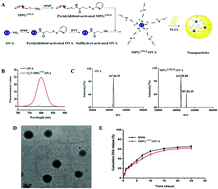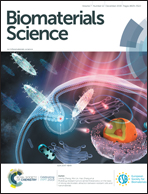A cell-penetrating peptide-assisted nanovaccine promotes antigen cross-presentation and anti-tumor immune response
Abstract
Exogenous antigens processed in the cytosol and subsequently cross-presented on major histocompatibility complex class I (MHC-I) molecules activate cytotoxic CD8+ lymphocytes (CTL), which are crucial in cancer immunotherapy. Here, we reported a nanovaccine, which was produced by encapsulating OVA (ovalbumin, a model antigen) chemically modified with MPGΔNLS (MPGΔNLS–OVA conjugate) into poly(lactide-co-glycolide) acid (PLGA) nanoparticles. We hypothesized that after the uptake of the nanovaccine into immune cells, MPGΔNLS, a cell-penetrating peptide (CPP), would assist the escape of the antigens from lysosomes into the cytosol, increase the amount of antigens processed in the cytosol and subsequently enhance antigen cross-presentation via MHC-I molecules to elicit cytotoxic CD8+ T cell responses. The results of the in vitro experiments demonstrated that the MPGΔNLS-OVA-loaded PLGA NPs not only elevated the release of OVA into the cytosol of dendritic cells (BMDCs), but also promoted the maturation and activation of BMDCs. It was also observed in mice vaccinated with MPGΔNLS-OVA-loaded PLGA NPs that the MPGΔNLS modification could stimulate the expansion of OVA-specific T-cells, generation of OVA-specific IgG antibodies and proliferation of OVA-specific memory T cells. Moreover, the treatment of E·G7-OVA tumor-bearing mice with MPGΔNLS-OVA-loaded PLGA NPs resulted in significantly suppressed tumor growth and prolonged survival periods of the mice compared to the treatment with unmodified OVA-PLGA NPs or free OVA. In summary, cell-penetrating peptides linked with antigens encapsulated in nanovaccines can spatiotemporally affect the intracellular localization of antigens, promote antigen cross-presentation and stimulate antigen-specific immune responses, especially CTL responses. Therefore, the CPP modification on antigens is an innovative approach to enhance the efficacy of nanovaccines for cancer immunotherapy.



 Please wait while we load your content...
Please wait while we load your content...